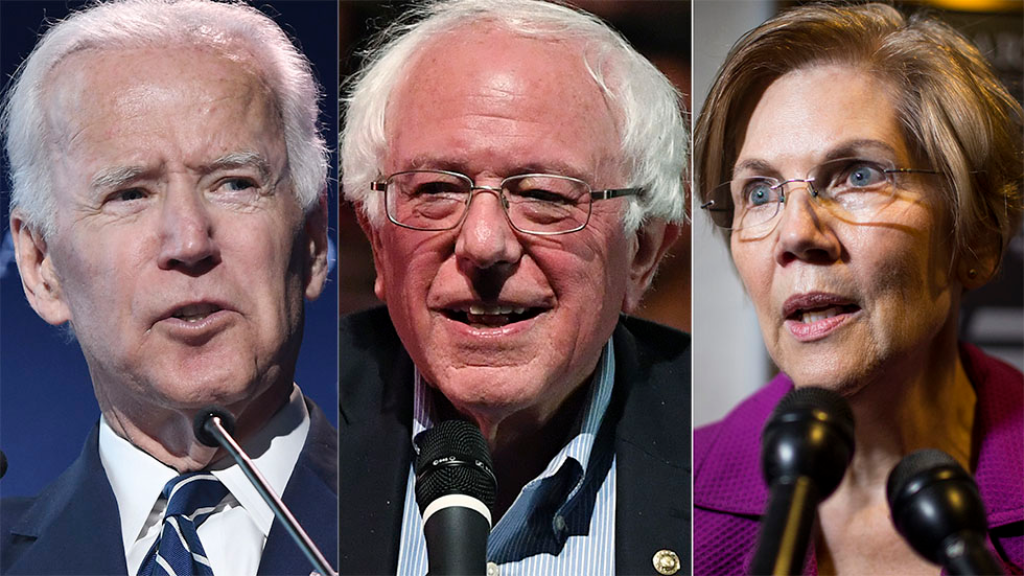I think Nate Silver makes a good point when he says that there are some candidates in the contest for the Democratic Party’s presidential nomination who are doing better than expectations but only Joe Biden and Elizabeth Warren are actually doing well. They’re really the only ones who can be satisfied that they’re meeting their own expectations for progress. We’re almost to the point that we can begin to think of this as a two-person race.
In looking at national polls pre- and post-September 23 (the date Silver uses as the beginning of the impeachment process), there are a few interesting observations we can make. The first is that Biden is actually slightly up despite having his name dragged through the mud. It would probably be fairer to say that he’s holding steady, but there’s no sign in erosion. This appears to be the case for most of the candidates, too, as the majority of them, like Biden, are up or down less than a point.
But that doesn’t mean the polls have been static. Elizabeth Warren has gained a substantial 5.7 percent and is now nearing parity with Biden. Almost all of her gains appear to have come from Kamala Harris (down 2.6 percent), Cory Booker (down 1.3 percent) and Bernie Sanders (down 1.1 percent).
Sanders is actually weathering the fallout from his heart attack surprisingly well, but his campaign has been losing slow and steady ground to Warren for a couple of months now. He’s now looking like a second tier candidate, albeit the only second tier candidate in the race. The real news here is that Kamala Harris has fallen to 4.7 percent in the national polls. This appears to be fatal to her campaign hopes, as she really need to move upward into the teens to sustain a serious operation.
I suspect Harris doesn’t have much time to right her ship, but there is one small hopeful sign. She’s seems to have lost the battle with Warren for voters who were undecided between the two of them, but she’s also the logical landing point for these voters if Warren’s campaign badly falters in the coming months. I think her model was more reliant on Biden faltering so she could pick up some fleeing moderates, but at this point I think she’d need both Warren and Biden to collapse to get back into contention.
National polls only tell part of the story, of course. In Iowa, Warren has led in two of three recent polls and Sanders remains very much in the running. In New Hampshire, Warren had led in all three of the most recent polls and Sanders has slipped into a distant third place. Yet, Biden enjoys a narrow lead in Nevada (where Bernie Sanders looks competitive) and a massive lead in South Carolina.
Since there’s an advantage to winning the earliest contests, I think Warren looks like she’s in the best position right now. But she doesn’t have Iowa locked down by an means (RCP Avg. Warren 22.7, Biden 19.3, Sanders 16.0).
For both Biden and Sanders, it would be a very bad development if Warren were to win Iowa because it would probably solidify her advantage in New Hampshire and give her a sweep of the first two contests. Sanders would be effectively knocked out, I think, because it will kill his chances in Nevada and any chance of coming in second place in South Carolina. Biden is in a better position to recover from losing the first two (or even three) battles because of his strong lead in South Carolina. If he were to lose in Iowa and New Hampshire (and perhaps Nevada as well), I’m not sure that his lead in the Palmetto State would hold up, and it certainly would narrow.
While Sanders probably needs to win Iowa in order to survive, Biden would be in a decent position losing there provided that the winner were anybody other than Warren.
I suppose there is still plenty of time for the top three candidates to stumble or for a lower tier candidate to catch fire, but the eventual dynamics of the race seems to be coming into view. Iowa looks huge. As I wrote back on September 19, Kamala Harris has put all her chips on Iowa, so it will be decisive for her campaign. That appears to be the case for Sanders, too. Warren will be sitting pretty if she wins the Hawkeye State but in much more of a dogfight if she does not. And Biden really needs to avoid an outcome where Warren carries the first two states.
This is a very stupid way to decide a nomination. I’ve written that the Iowa caucuses are a fraud and should be doomed. It’s a subject that I will no doubt return to many times before Iowan Democrats turn out in the cold next winter to decide the fate of the country.
For now, I’ll just remind you of what happened in Iowa in 2012.
…an initial and preliminary count of the votes indicated that Mitt Romney had won the caucuses by eight votes. And that is how the media reported it. Yes, Rick Santorum had come out of nowhere to finish a shockingly strong second place, but he hadn’t won anything. Romney, who had suffered the indignity of lagging behind in the polls (at one time or another) to everyone in the race except Santorum, had managed to right his ship and avoid a bad stumble out of the gate. This was hugely helpful to him as the contest moved to Romney’s home turf in New Hampshire. Remember, not only had he served as governor in neighboring Massachusetts, but he owned a home in New Hampshire.
Two weeks later, however, and after Romney romped to victory in the Granite State, the Iowa Republican Party had to make two embarrassing announcements. The first was that they had finalized counting the votes and that it turned out that Rick Santorum didn’t have an eight vote deficit but instead a 34-vote lead. The second announcement was that it was impossible to actually declare a winner [because results from eight of 1,774 precincts could not be located for certification]
…In 2012, Iowa had 28 delegates at the convention, and according to the New York Times, Ron Paul got 22 of them, Romney got five, and Rick Santorum got zero. One vote is listed as undetermined but probably went for Romney…
…you can justifiably say that Santorum won Iowa because he had the most votes in the certified count, or that Romney won because he benefited the most from the result, or that Ron Paul won because he actually got almost all the delegates, or that no one won because the party refused to declare a winner.
The Democratic caucuses operate with slightly different rules in Iowa, but it remains a beauty contest where the delegates are not decided or committed to any candidate regardless of results. It literally does not matter who wins in determining how the delegates will be awarded. Yet, the perception that someone won has a gigantic impact on the media coverage, and next year this looks to be truer and more consequential than ever.







